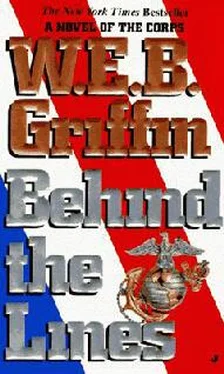W.E.B. Griffin - The Corps VII - Behind the Lines
Здесь есть возможность читать онлайн «W.E.B. Griffin - The Corps VII - Behind the Lines» весь текст электронной книги совершенно бесплатно (целиком полную версию без сокращений). В некоторых случаях можно слушать аудио, скачать через торрент в формате fb2 и присутствует краткое содержание. Жанр: prose_military, на английском языке. Описание произведения, (предисловие) а так же отзывы посетителей доступны на портале библиотеки ЛибКат.
- Название:The Corps VII - Behind the Lines
- Автор:
- Жанр:
- Год:неизвестен
- ISBN:нет данных
- Рейтинг книги:3 / 5. Голосов: 1
-
Избранное:Добавить в избранное
- Отзывы:
-
Ваша оценка:
- 60
- 1
- 2
- 3
- 4
- 5
The Corps VII - Behind the Lines: краткое содержание, описание и аннотация
Предлагаем к чтению аннотацию, описание, краткое содержание или предисловие (зависит от того, что написал сам автор книги «The Corps VII - Behind the Lines»). Если вы не нашли необходимую информацию о книге — напишите в комментариях, мы постараемся отыскать её.
The Corps VII - Behind the Lines — читать онлайн бесплатно полную книгу (весь текст) целиком
Ниже представлен текст книги, разбитый по страницам. Система сохранения места последней прочитанной страницы, позволяет с удобством читать онлайн бесплатно книгу «The Corps VII - Behind the Lines», без необходимости каждый раз заново искать на чём Вы остановились. Поставьте закладку, и сможете в любой момент перейти на страницу, на которой закончили чтение.
Интервал:
Закладка:
Weston hadn't been in a cockpit since. There were few aircraft of any type left in the Philippines. When it became evident that his chances of returning to flying or of being evacuated to Pearl Harbor were negligible, he was assigned to the staff of the Aviation Officer-Paulson-of Marine Barracks, Cavite.
When Cavite was blown up and left for the enemy, all remaining Marine personnel were transferred to the 4th Marines. Paulson was assigned to the personnel section, relieving a major who had served with the 4th Marines in China and whose infantry expertise could be put to better use, and Weston be-came his deputy.
In Paulson's view, there was not much left for the Acting Personnel Offi-cer to do but wait for the Japanese to land on Corregidor; whereupon he would order the destruction of personnel records by thermite grenade, grab his rifle, and fight, until the end, as an overage, overranked platoon leader.
There was only one alternative to this course of action, one that Paulson himself could not accept, but which, the more he thought about it, seemed to be a viable course of action for Lieutenant Jim Weston.
Before the war, Paulson came to know a number of Army Air Corps pilots. One of them, an Army Air Corps major-also transferred to ground duty when there were no more airplanes for him to fly-approached him and announced that since the war here was about over and he had no intention of surrendering, he was going to head for the hills and hide out. From there, he would either try to escape to Australia, or maybe even fight as a guerrilla.
"You want to come along, Steve?" he asked.
Paulson gave the offer a good deal of thought before declining. For one thing, it would be AWOL, or perhaps even desertion. Something about that rubbed him the wrong way. The very word "desertion" made him consider that since he still had some contribution to make, even if only as a platoon leader, he would in fact be deserting the enlisted men at a time when they needed him most. Finally, although he didn't like to face the fact, his health was shot. He had some sort of rash whose suppurating sores seemed to grow worse daily. His teeth were falling out. There was no way he could survive running around in the hot, physically debilitating jungles of the Philippines. He would become a burden to whomever he was with.
Weston, however, was another matter. Although Paulson was sure he would try his best, the young pilot would be nearly worthless as a platoon leader. And maybe even worse, he could be a burden to those he was com-manding. On the other hand, if Weston could somehow get out of the Philip-pines, he would be of great use to The Corps. There had been a pilot shortage before the war, and that shortage must, Paulson reasoned, be even more acute now.
And even if Weston couldn't escape from the Philippines, he was young, and-considering the circumstances-in good health. He could probably make himself useful to a guerrilla operation. For one thing, he had a degree in electri-cal engineering, which meant he probably knew something about radios. Any guerrilla force needed radios.
The final consideration was very simple. If Weston stayed on Corregi-dor, one of two things was certain to happen: he would be killed, or he would be taken prisoner. It was equally certain that he would be more of a problem than an asset in the final fighting. If he went off into the hills, tried to escape to Australia, he would probably be killed. But he might not. He might escape. And if he did, he could make a contribution. Or he might be useful to some guerrilla commander (Paulson thought of his Air Corps friend, who one day simply vanished from Corregidor) and make a contribu-tion that way.
On The Rock, the alternatives to death and/or surrender were the subject of many careful, soft conversations between officers. Yet, as close as he and Paul-son had become, Weston had never brought the subject up.
Is this, Paulson wondered, because he's been thinking about it, and is afraid I will order him to forget about it if he mentions it to me? Or because he thinks his duty is clear, to stay here and get killed or become a prisoner? And doesn't want me to think he's even thought about taking off?
Finally-he later recognized this as one of the most difficult things he'd ever done in The Corps-Paulson brought the subject up to Weston himself, directly and somewhat forcefully. They were discussing Weston's alterna-tives-as possibilities Weston could choose, one possibility being to try to es-cape. But then Paulson stopped and changed that from a choice to something close to an order. And Weston accepted it as an order.
Because, Paulson wondered, he is a good Marine and obeys whatever order he is given, even one that frightens him? Or because he was on the edge of making that decision for himself, and my making it an order made it easier?
By then-none of this took more than a few days, but things were disinte-grating at a rapidly accelerating pace-it was harder and harder to leave the island. The boats, the only means of crossing the two miles of water from The Rock to Bataan, were disappearing... partly as a result of enemy action, partly from lack of parts and maintenance, and partly, Paulson suspected, because they'd been "requisitioned" by people who were electing not to surrender when the end came.
There seemed to be proof of that. The boats now carried guards to make sure they completed their intended trips. And getting permission to leave the island for any purpose now required the authorization of a colonel or better.
Solving that was an emotional problem for Paulson, not a practical one. As a paper-pusher, he routinely signed colonels' names to all sorts of documents, including permission authority to leave the island. Sometimes he added his ini-tials to these, sometimes not.
He did not think his memorandum ordering Weston to Bataan on a supply-gathering mission would be questioned. But writing it was still one of the most serious violations of the officer's honor code: "willfully uttering a document known to be false."
At 0900, he sent a runner after Lieutenant Weston, whom he had loaned to the Army Finance Officer. Weston and a half-dozen other officers had spent the past three days making lists, in triplicate, of the serial numbers of all the one-hundred-, fifty-, twenty-, and ten-dollar bills in the possession of Army and Navy Finance Officers.
When the lists were completed, the money would be burned, to keep it out of Japanese hands. Attempts would be made to get the lists somehow out of the Philippines.
There's no food, and no medicine, and damned little booze, Paulson thought with bitter amusement, but the Army and the Navy are loaded with dough.
"You wanted to see me, Sir?" Weston asked.
Paulson met the eyes of the young, unhealthily thin officer.
"I've decided we should make one more attempt-you should make one more attempt-to find the parts for our generator," Paulson said.
"Aye, aye, Sir," Weston replied, trying but not quite succeeding to keep his face expressionless.
"Here's your boat pass," Paulson said, handing him the authorization.
"Yes, Sir."
"And the necessary funds," Paulson went on. "You'll have to sign for them."
"Aye, aye, Sir."
Weston's eyes widened when he glanced into the envelope Paulson handed him. It was a thick stack of crisp, unissued fifty- and one-hundred-dollar bills. Far more money than was necessary to buy generator parts.
"Five thousand dollars," Paulson said. "Inflation seems to have come to this Pacific paradise."
"Yes, Sir," Weston said as he leaned over to sign the receipt on Paulson's desk.
"There's supposed to be a motor pool on shore," Paulson said. "You are authorized, by your pass, to draw a vehicle. You may or may not get one."
"Yes, Sir."
"I've arranged for an interpreter to go with you. He's supposed to be flu-ent in Spanish. Pick him up at the Headquarters Company CP."
Читать дальшеИнтервал:
Закладка:
Похожие книги на «The Corps VII - Behind the Lines»
Представляем Вашему вниманию похожие книги на «The Corps VII - Behind the Lines» списком для выбора. Мы отобрали схожую по названию и смыслу литературу в надежде предоставить читателям больше вариантов отыскать новые, интересные, ещё непрочитанные произведения.
Обсуждение, отзывы о книге «The Corps VII - Behind the Lines» и просто собственные мнения читателей. Оставьте ваши комментарии, напишите, что Вы думаете о произведении, его смысле или главных героях. Укажите что конкретно понравилось, а что нет, и почему Вы так считаете.










